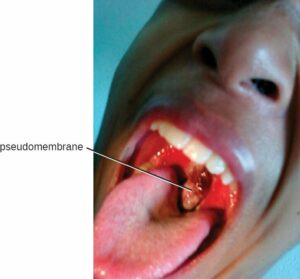Diphtheria Outbreak in Abuja: Cases Reported
There is a confirmed outbreak of diphtheria outbreak in Abuja, Nigeria. It has already claimed the life of a 4-year-old boy out of the eight reported cases. Here’s what you need to know about this serious disease and what to do. Read and share with others.
Advertisements

NewsReport Nigeria learned that Diphtheria is a serious disease caused by a bacteria 🦠 known as Corynebacterium diphtheria.

It mostly affects the nose, tonsils, voice box, and throat, making it difficult to breathe or swallow.
Diphtheria is transmitted through 1. Respiratory droplets, e.g., Coughing or sneezing 2. Objects infected with the bacteria, e.g., toys 3. Contact with open wounds or infected clothes or bedding
What are the symptoms of diphtheria? 1. High fever 2. Sore throat and noisy breathing3. Swollen glands in the neck4. Body weakness5. The thick grey membrane covering the back of the throat (which appears within 2-3 days of illness) is known as the pseudomembrane.

Pseudomembrane
If diphtheria is not treated quickly, what can happen? 1. Difficulty in breathing 2. Heart failure3. Paralysis 4. Death (if not quickly treated)
Although diphtheria can be treated with diphtheria antitoxin and strong antibiotics, prevention is far better than cure.
How can you prevent diphtheria?
Through VACCINATION!

Vaccination
Infants and toddlers should take their DTaP (Diptheria, Tetanus, and Pertussis) vaccines at:2 months3 months5 months, and18 months of age
Adults should have routine Diphtheria booster doses every 10 years.Non-immunized or incompletely immunized people should have up-to-date vaccinations as soon as possible.
People at the highest risk of getting diphtheria are children and adults who are not up-to-date with their vaccinations. Please ensure you and your family are fully vaccinated.
Also, report any suspected case of Diphtheria to the nearest health center. Stay safe out there!
You can also report suspected cases of diphtheria directly to @NCDCgov or @Fmohnigeria.
Source Telemed Clinic